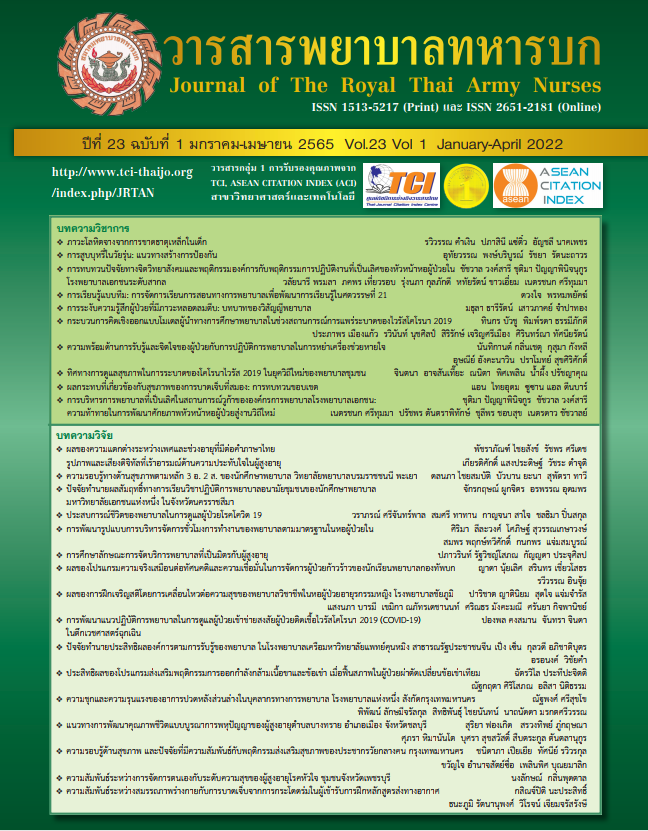Study of Episodic Memory by Using FNAME Test in Postmenopausal Women Working at Professional Daytime in Hospital: Pilot Study
Keywords:
Episodic memory, FNAME test, Postmenopausal women, Pilot StudyAbstract
The aim of this study was to study episodic memory by using the Face-Name Associative Memory Exam test (FNAME test) in postmenopausal women working at professional daytime in hospital. Ten volunteering postmenopausal women participants were recruited in this study, they were tested by FNAME task. Data were analyzed by descriptive statistic, these were estimated raw score to Z-score composites, and Pearson product-moment correlation coefficient. The results showed some decline of episodic memory by Z-score median (-0.15), mode (-0.15), rang (2.43), maximum, minimum (-1.56, 1.87 respectively) and percent of individual test score lower mean (70%). Analysis was pairwise Z-score of subscales these were significantly to high correlation of Cues Recall Name immediately and Cues Recall Name delayed. In conclusions, this pilot study demonstrated data, episodic memory was tested by using FNAME that trend is declined in Thai postmenopausal women and its role in shaping memory function in early elderlies. After, the FNAME test will test in larger population, these are more reliable of data and using other occupation postmenopausal women for screening episodic memory decline early in postmenopausal women.
Downloads
References
Harlow SD, Gass M, Hall JE, Lobo R, Maki P, Rebar RW, et al. Executive summary of the Stages of Reproductive Aging Workshop + 10: addressing the unfinished agenda of staging reproductive aging. Menopause 2012;19(4):387–95.
Weber MT, Mapstone M, Staskiewicz J, Maki PM. Reconciling subjective memory complaints with objective memory performance in the menopausal transition. Menopause 2012; 19(7):735-41.
Weber MT, Rubin LH, Maki PM. Cognition in perimenopause: the effect of transition stage. Menopause 2013;20(5):511-8.
Jacobs EG, Weiss BK, Whitfield-Gabrieli S, Buka SL, Klibanski A, Goldstein JM. Impact of Sex and Menopausal Status on Episodic Memory Circuitry in Early Midlife. The Journal of Neuroscience 2017;36(39):10163-73.
Rentz DM, Weiss BK, Jacobs EG, Cherkerzian S, Klibanski A, Remington A, et al. Sex differences in episodic memory in early midlife: impact of reproductive aging. Menopaus 2017;24(4):400-8.
Kaliyaperumal D, Elango Y, Alagesan M, Santhanakrishanan I. Effects of sleep deprivation on the cognitive performance of nurses working in shift. Journal of Clinical & Diagnostic Research 2017;11(8):CC01-03.
Esmaily A, Jambarsang S, Mohammadian F, Mehrparvar, AH. Effect of shift work on working memory, attention and response time in nurses. International Journal of Occupational safety and Ergonomics 2021;20:1-6.
Tulving, E. Episodic memory: From mind to brain. Annual Review of Psychology 2002;53:1-25.
Tromp D, Dufour A, Lithfous S, Pebayle T, Despres O. Episodic memory in normal aging and Alzheimer disease: Insights from imaging and behavioral studies. Ageing Research Reviews 2015;24(B):232-62.
Udomlap R. Role of Nurse in Decrease Burden of Caregivers of Older Persons with Dementia. Journal of The Royal Thai Army Nurses. 2019;20(2):26-32. (in Thai)
Sriworakul W, Srinualnad P, Sukhonthachit P, Chaiphibalsarisdi P, Huddleston D. Screening for Dementia in Elderly, Mae Chaem District, Chiang Mai Province. Journal of The Royal Thai Army Nurses 2020;21(3):243-51. (in Thai)
Undara W, Singhasenee U, Wongnitikul P. The study of dementia, knowledge and prevention of dementia and the demographic data in the elderly association of Royal Thai Air Force Nursing College. Journal of The Police Nurse 2016;8(1):23-33. (in Thai)
Baker LD, Asthana S, Cholerton BA, Wikinson CW, Plymate SR, Green PS, et al. Cognitive response to estradiol in postmenopausal women is modified by high cortisol. Neurobiology of Aging 2012;33:829.e9-.20.
Mielke MM, Vemuri P, Rocca WA. Clinical epidemiology of Alzheimer’s disease: assessing sex and gender differences. Clinical epidemiology 2014;6:37-48.
Mosconi L, Rahman A, Diaz I, WU X, Scheyer O, Hristov HW, et al. Increased Alzheimer’s risk during the menopause transition: A 3-year longitudinal brain imaging study. PLOS ONE 2018;13(12):1-13.
Allen TA, Fortin NJ. The evolution of episodic memory. PNAS 2013;110(2):10379-86.
Sahu A, Christman SD, Propper RE. The contributions of handedness and working memory to episodic memory. Memory & Cognition 2016; 44:1149-56.
Papp KV, Amariglio RE, Dekhtyar, M, Roy K, Wigman S, Bamfo R, et al. Development of a psychometrically equivalent short form of the Face-Name Associative Memory Exam for use along the early Alzheimer’s disease trajectory. The clinical Psychologist 2014;28(5):771-85
Avis NE, Crawford SL, Greendale G, Bromberger JT, Everson-Rose SA, Gold EB, et al. Duration of menopausal vasomotor symptom over the menopause transition. JAMA International Medicine 2015;175(4):531-9.
Thongkaeo T, Suppapitiporn S. Stress in workplace and its related factors among registered nurse at outpatient department of a hospital in Bangkok. Chula Med Journal 2018;62(2): 197-209. (in Thai)
Amariglio RE, Frishe K, Olson LE, Wadsworth LP, Lorius N, Sperling RA, et al. Validation of the Face Name Associative Memory Exam in cognitively normal older individuals. Journal of Clinical and Experimental Neuropsychology 2012;34(6):580-7.
Downloads
Published
How to Cite
Issue
Section
License
Copyright (c) 2022 Journal of The Royal Thai Army Nurses

This work is licensed under a Creative Commons Attribution-NonCommercial-NoDerivatives 4.0 International License.
บทความหรือข้อคิดเห็นใดใดที่ปรากฏในวารสารพยาบาลทหารบกเป็นวรรณกรรมของผู้เขียน ซึ่งบรรณาธิการหรือสมาคมพยาบาลทหารบก ไม่จำเป็นต้องเห็นด้วย
บทความที่ได้รับการตีพิมพ์เป็นลิขสิทธิ์ของวารสารพยาบาลทหารบก
The ideas and opinions expressed in the Journal of The Royal Thai Army Nurses are those of the authors and not necessarily those
of the editor or Royal Thai Army Nurses Association.






